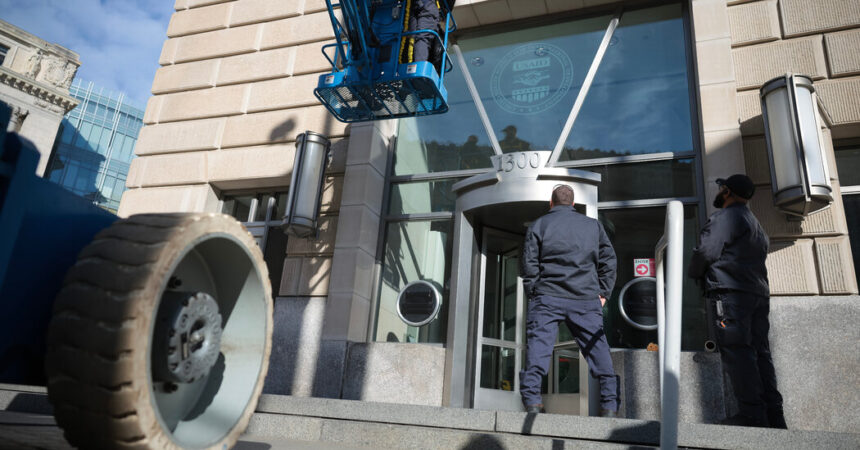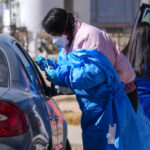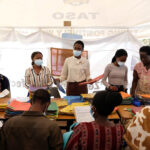Funds from the world’s richest nation as soon as flowed from the biggest international help company to an intricate community of small, medium and huge organizations that delivered help: H.I.V. medicines for greater than 20 million folks; diet dietary supplements for ravenous youngsters; help for refugees, orphaned youngsters and girls battered by violence.
Now, that community is unraveling. The Trump administration froze international help for 90 days and has deliberate to intestine the U.S. Company for Worldwide Improvement to only 5 p.c of its work drive, though a federal decide paused the plan on Friday. Given wars and strapped economies, different governments or philanthropies are unlikely to make up for the shortfall, and recipient nations are too hamstrung by debt to handle on their very own.
Even the biggest organizations are unlikely to emerge unscathed. In interviews, greater than 25 help staff, former U.S.A.I.D. staff and officers from help organizations described a system thrown into mass confusion and chaos.
A tower of blocks could take hours to construct, however “you pull a kind of blocks out and it collapses,” mentioned Mitchell Warren, govt director of the H.I.V. prevention group AVAC, which relied on U.S.A.I.D. for 38 p.c of its funding.
“You’ve gotten rid of all the employees, all the institutional reminiscence, all the belief and confidence, not solely in the US however within the dozens of nations wherein U.S.A.I.D. works,” Mr. Warren mentioned. “These issues have taken many years to construct up however two weeks to destroy.”
Small organizations, some with as few as 10 staff, have folded. Some midsize organizations have furloughed as much as 80 p.c of their staff. Even massive organizations — together with Catholic Reduction Providers and FHI 360, among the many largest recipients of U.S.A.I.D. funding — have introduced massive layoffs or furloughs.
In a single survey, about 1 in 4 nonprofits mentioned they could final a month; greater than half mentioned that they had sufficient reserves to outlive for 3 months at most.
The injury is compounded by President Trump’s announcement that the US would withdraw from the World Well being Group, forcing its leaders to announce cost-cutting measures of their very own.
World well being consultants mentioned that the longer term instantly regarded unsure, even dystopian, and struggled to articulate options.
“We’re fairly clear that the longer term appears to be like completely different,” mentioned Christine Stegling, a deputy govt director at UNAIDS, the United Nations’ H.I.V. division. However “none of us but has an actual image of what meaning.”
The injury extends not simply to the well being of individuals overseas however to Individuals and American companies. Together with the roughly 100,000 positions reduce abroad, an estimated 52,000 Individuals in 42 states have misplaced their jobs.
The worldwide well being care provide chain market was valued at almost $3 billion in 2023 and was anticipated to develop. Annually, about $2 billion in American agricultural merchandise had been bought as meals help. The abrupt halt dangers greater than $450 million value of corn, lentils, rice and different commodities which might be in transit or in warehouses and ports.
“The financial influence of that is going to be astounding to folks’s lives and companies,” mentioned Lisa Hilmi, govt director of CORE group, a consortium of huge international well being practitioners.
Ms. Hilmi, who labored as a nurse in lots of battle and catastrophe zones, mentioned {that a} lack of well being companies might drive poor well being, malnutrition, epidemics, civil unrest and “a much wider meltdown of society internationally.”
“If America is the most important superpower, then we have to act prefer it,” she mentioned. “And a part of that’s performing with humanity.”
‘Dizzying chaos’
Every week after the help was paused, Secretary of State Marco Rubio issued a waiver for lifesaving humanitarian help and medicines. However stop-work orders for some packages, together with meals help, adopted even after the waiver’s announcement.
Final week, one massive group received the go-ahead for a few of its packages. However later that very same day the Trump administration positioned dozens of U.S.A.I.D. officers on go away, leaving the group questioning whether or not the division that issued the waiver was nonetheless a viable entity and the officer who wrote the discover was nonetheless employed.
“It’s one other instance of the dizzying chaos that this administration has inflicted on us,” mentioned a senior official on the group.
The leaders of most organizations that depend upon U.S.A.I.D. funding wouldn’t communicate on the document, fearing retaliation from the Trump administration.
Even when organizations have acquired approvals to proceed, no cash has flowed. One massive group acquired lower than 5 p.c of its anticipated finances for the interval, however others have acquired nothing.
“I clearly welcome that the secretary accredited a waiver and put a submit on the web, however we can not pay our payments with the submit,” a senior official at a big group mentioned of Mr. Rubio.
Some teams really feel morally obligated to proceed to supply lifesaving companies, hoping that they’ll ultimately be reimbursed. However with dozens of small organizations shuttering by the day, injury to among the world’s most susceptible teams is accruing, some consultants warned.
The ecosystem of worldwide well being is so intently interwoven that the pause has frozen the work even of organizations that obtain no cash from the U.S. authorities.
The nonprofit IPAS works with a whole bunch of organizations in dozens of nations to supply entry to contraception, abortion and different reproductive well being companies. Most of the clinics have shuttered, some completely, mentioned Anu Kumar, the group’s president.
The pace of the disruption didn’t enable clinics time to make contingency plans or taper their dependence on the funding, she mentioned, including, “This undoubtedly has a ripple impact.”
After one week of the freeze, greater than 900,000 ladies and ladies could have been denied reproductive care, a determine that can develop to 11.7 million over the 90-day pause, in line with the Guttmacher Institute. “That’s greater than your entire inhabitants of North Carolina,” Dr. Kumar mentioned.
In consequence, the institute estimated, 4.2 million women and girls will expertise unintended pregnancies, and eight,340 will die from problems throughout being pregnant and childbirth.
Many H.I.V. packages had been centered on “key populations” at highest threat, together with transgender folks and males who’ve intercourse with males, who’re marginalized and even criminalized in some international locations.
In Uganda, for example, the place a harsh anti-gay regulation can carry the dying penalty for consensual gay exercise for folks with H.I.V., nonprofit teams funded by the US have been essential sources of economic and medical help.
“It’s one thing each American must be proud about, however I don’t suppose they understand it,” mentioned Kenneth Mwehonge, govt director of the Coalition for Well being Promotion and Social Improvement, which screens the standard of different H.I.V. packages in Uganda.
“I don’t suppose they understand how a lot they’ve contributed and the lives they’ve saved, they usually don’t have fun it sufficient,” he mentioned. His group has needed to let go of 140 full-time employees members and group staff.
Childhood immunizations, malaria prevention and remedy and malnutrition packages are additionally stalled. So are packages on training, financial empowerment, preventive well being companies and household planning.
“It is a excellent storm for poor well being outcomes, no getting round it,” mentioned Elisha Dunn-Georgiou, govt director of the World Well being Council, a membership group of well being teams.
Some U.S.A.I.D.-funded organizations supplied clear water and sanitation, significantly for refugee populations. Others helped governments shield towards ailments like polio and measles in battle zones and amongst nomadic teams. Nonetheless others supplied experience in containing outbreaks of harmful pathogens like Ebola and Marburg, that are smoldering in Uganda and Tanzania.
Any of those threats, if not contained, might simply cross borders and land on America’s shores, mentioned Rebecca Wolfe, who labored at the united statesA.I.D.-funded nonprofit Mercy Corps for 15 years and is now a growth knowledgeable on the College of Chicago.
The world “is so interconnected, and to attempt to divide it into ‘America first’ and the remaining not works in as we speak’s age,” she mentioned.
‘It looks like grief’
Some U.S.A.I.D. staff and help organizations mentioned that the sudden unplugging of funding was antithetical to the objective: serving to international locations turn out to be impartial sufficient to look after their very own residents.
Previously few years, U.S.A.I.D. has been engaged on coaching midwives, nurses, medical doctors, laboratories and hospitals to start to switch the accountability.
Self-sufficiency would require small nonprofits on the native stage to ship companies, however the smallest organizations are additionally the least more likely to climate the present storm.
“The irony is that their precedence in Mission 2025 is localizing and shifting away from huge companions,” mentioned Jeremiah Centrella, former common counsel at Mercy Corps. “However huge worldwide companions are the one ones with entry to personal donors and robust sufficient steadiness sheets to get via this.”
It’s unclear what’s going to occur to the tens of 1000’s of staff who instantly haven’t any jobs and no trade wherein to search out one.
In Kenya, Mercy Githinji cared for 100 households within the Kayole neighborhood of Nairobi when the clinic the place she labored, run by the united statesA.I.D. Tumukia Mtoto Mission, abruptly closed down. Now Ms. Githinji, a 52-year-old single mom of 4 daughters, is uncertain how she pays hire or faculty charges.
The clinic supplied medical care but additionally helped residents with hire cash, meals and sanitary pads. “Now there’s no verify, there’s nothing,” Ms. Githinji mentioned. “It’s very unhealthy. Individuals are struggling.”
Even when help had been to renew subsequent week, clinics and workplaces have already closed, folks have moved, and belief has been damaged, some former U.S.A.I.D. staff mentioned.
Others mentioned they had been desperately saddened — not for themselves, however for the folks that they had pledged to serve.
“The one approach I’ve been in a position to describe it’s, it looks like grief,” one former U.S.A.I.D. worker mentioned.
“Our mission is to save lots of lives and alleviate struggling,” she mentioned. “Not having the chance to contribute to that, and have it’s taken away in a single day, arbitrarily, with out discover or cause, being known as a prison or radical lunatic, has simply been deeply heartbreaking.”
Stephanie Nolen contributed reporting.








